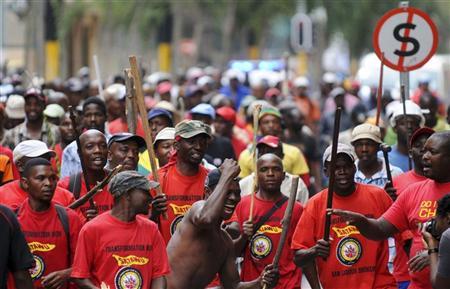By Agnieszka Flak and Wendell Roelf
JOHANNESBURG (Reuters) – About a third of striking South African truckers have agreed to return to work on Wednesday, easing pressure on Africa’s biggest economy where two weeks of labour unrest in the transport sector have hit supplies of fuel, cash and consumer goods.

But disputes in the mining sector escalated after Gold One fired the majority of its 1,900 workers at its Ezulwini operation, paralysed since last week by a wildcat strike. Atlatsa Resources said it had also fired 2,161 miners for an illegal strike.
Tuesday’s decision by three small transport unions with 15,000 members to abandon the truckers strike puts pressure on the biggest labour group, the South African Transport and Allied Workers Union (SATAWU), which represents about 28,000 workers, to reach a deal and suspend its calls to widen the strike.
Since August, almost 100,000 workers across South Africa, including 75,000 in the mining sector, have downed tools in often illegal and violent strikes that may hit economic growth this year and undermine investor confidence in the minerals hub.
“The three unions advised that they came to this decision in light of the fact that employers have now offered double digits (a pay rise) for the year,” an employers association said. It was still in talks with all groups to hammer out a final deal.
The rand, which fell to 3-1/2 year lows against the dollar on Monday on worsening investor sentiment about labour strife, firmed to 8.735 immediately after the news of the three unions saying they will end their walk-out.
SATAWU is demanding annual wage increases of 12 percent for two years – more than double the inflation rate, while employers have offered a total 18 percent pay rise over that period.
“We are willing to compromise on our demands, but only as long as the employers do the same,” said Vincent Masoga, a spokesman for SATAWU. Talks with employers were held on Tuesday.
An employers body said last week that the freight industry was losing around 1.2 billion rand in turnover each week. If the protests expand to rail and ports, exports of coal and other minerals would also be hit.
Affected companies include logistics groups Imperial Holding, Super Group, Grindrod, Barloworld and Bidvest.
MINING UNREST
President Jacob Zuma’s ruling African National Congress has been criticised for letting the strikes spread. Moody’s ratings agency downgraded government bonds a notch last month, saying ineffectual governance posed long-term economic risk.
Large parts of the mining sector, responsible for about 6 percent of gross domestic product, have been brought to a standstill in the last two months by wildcat strikes by more than 15 percent of its workforce.
Platinum miner Lonmin reached a deal in September to end a deadly wildcat strike for a yearly wage increase as high as 22 percent for some miners.
Within hours of the deal, workers at nearby platinum mines called for similar raises. In the days that followed, wildcat strikes hit sectors including gold, iron and car manufacturing.
Last week, mining giant Anglo American Platinum fired 12,000 of its workers who went on an illegal strike, raising the stakes in the labour disputes. Analysts are warning of further job losses and the closure of marginal shafts.
Almost 50 people have been killed in the current labour strife – 34 of them by shot dead by police on August 16 at Lonmin’s Marikana mine in the deadliest security incident since the end of apartheid in 1994.
“The ongoing violence that has led to the senseless and untimely death of workers will further discourage direct investment in the industry where investors were already hesitant about the mining industry in South Africa,” Bheki Sibiya, the chief executive of the Chamber of Mines, said in a statement.
Kumba Iron Ore said it could not honour its contractual obligations to deliver ore to ArcelorMittal’s South African unit due to an illegal protest at its giant Sishen mine.
On Monday, a local government workers’ union said it also planned a protest in the next few days, the first sign of labour unrest spreading into the public sector.





